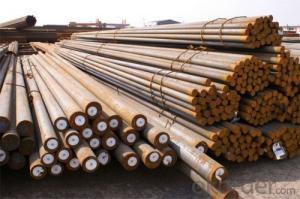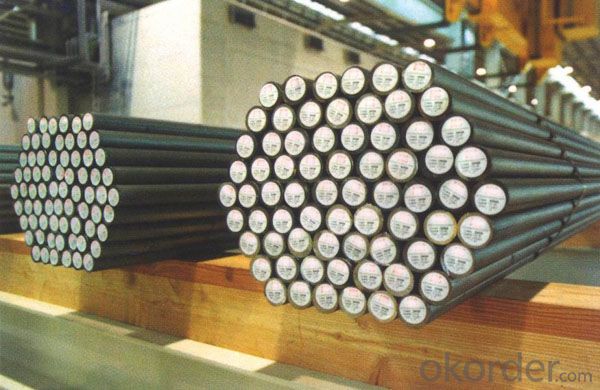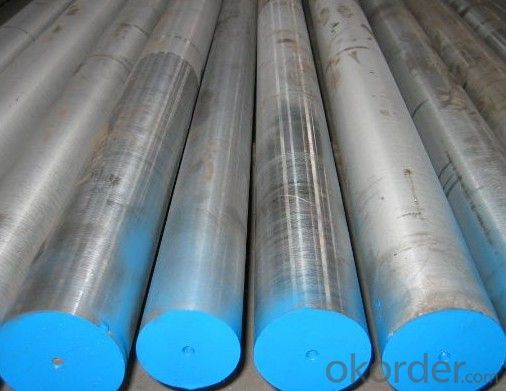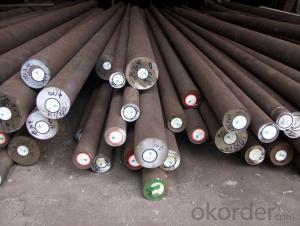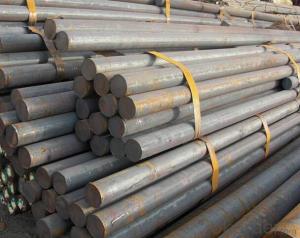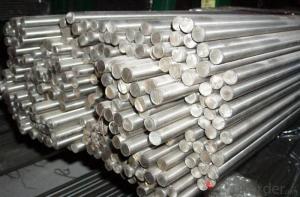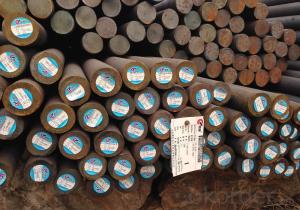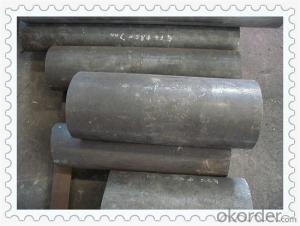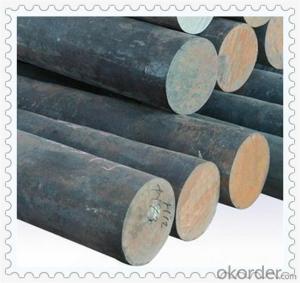Special Steel Round Bar AISI 4140 Alloy Steel
- Loading Port:
- China main port
- Payment Terms:
- TT OR LC
- Min Order Qty:
- 25 m.t.
- Supply Capability:
- 10000 m.t./month
OKorder Service Pledge
OKorder Financial Service
You Might Also Like
Specification
Special Steel Round Bar AISI 4140 Alloy Steel
1.4140/1.7225/42CrMo4/SCM440/EN19
2.good price and fast delivery time
3.large stocks
Equivalent grades
GB | DIN | AISI | JIS |
42CrMo | 1.7225 | 4140 | SCM440 |
Chemical Composition
C | Si | Mn | Cr | Mo | P | S |
0.38-0.43 | 0.40max | 0.60-0.90 | 0.90-1.20 | 0.15-0.30 | ≤0.035 | ≤0.035 |
Available size
Round steel bar 10-800mm | |||||||||
Flat steel bar 25-400mm*200-800mm |
Surface condition
Black surface/ Grinded/ Machined |
Hardness
Annealed HBS 217 max |
Characteristics
4140 Alloy Steel/SAE 4140 Steel Price is engineering steel supplied in quenched and tempered conditions. Very good machinability. High toughness. High creep strength. Repeated impact resistant capability. |
Applications
4140 Alloy Steel/SAE 4140 Steel Price is use to producecomponents with high requirements on toughness, e.g. gear wheels, pinions, connecting rods, parts for mechanical engineering . |
Heat treatment
| Forging | Heat to 1150°C. Hold until uniform. Minimum forging temperature 850°C.Cool slowly in ashes or sand etc. | ||||||||
| Annealing | Heat to 830°C-850°C.Cool in furnace. | ||||||||
| Normalising | Heat to 870°C-900°C.Cool in still air. | ||||||||
| Stress Relieving | Annealed: Heat to 600°C-650°C.Hardened: Heat to 500°C-550°C.Cool in still air. | ||||||||
| Hardening | Heat to 830°C-880°C. Quench in oil or polymer. | ||||||||
| Tempering | Heat to 450°C-700°C cool in still air. NB. Tempering within the range 200°C-420°C will result in temper brittleness and should be avoided. | ||||||||
Product show:

Workshop show:

FAQ:
1, Your advantages?
professional products inquiry, products knowledge train (for agents), smooth goods delivery, excellent customer solution proposale
2, Test & Certificate?
SGS test is available, customer inspection before shipping is welcome, third party inspection is no problem
3, Payment Terms?
30% TT as deposit and 70% before delivery.
Irrevocable L/C at sight.
4, Trading Terms?
EXW, FOB, CIF, FFR, CNF
5, After-sale Service?
We provides the services and support you need for every step of our cooperation. We're the business partner you can trust.
For any problem, please kindly contact us at any your convenient time.
We'll reply you in our first priority within 24 hours.
- Q: How does special steel perform in terms of electrical resistivity?
- Special steel typically has a relatively high electrical resistivity, which means it offers greater resistance to the flow of electric current compared to other materials. This property makes special steel useful in applications where low electrical conductivity is required, such as in electrical resistors or magnetic cores.
- Q: How does special steel contribute to the power generation industry?
- Special steel plays a crucial role in the power generation industry by providing the necessary strength, durability, and resistance to extreme temperatures and corrosive environments. It is used in the construction of turbines, generators, and other critical components, ensuring the efficient and reliable operation of power plants. Additionally, special steel's high heat resistance and excellent mechanical properties enable power plants to operate at higher temperatures, increasing energy efficiency and reducing emissions.
- Q: Can special steel be used in the agricultural equipment manufacturing industry?
- Yes, special steel can be used in the agricultural equipment manufacturing industry. Special steel, such as high-strength or wear-resistant steel, can enhance the durability, strength, and performance of agricultural equipment, making it suitable for various applications in the industry.
- Q: What is the impact of manganese in special steel alloys?
- Manganese plays a crucial role in special steel alloys and has a significant impact on their properties and performance. Special steel alloys, also known as high-strength or low-alloy steels, are designed to have enhanced mechanical properties, such as increased strength, durability, and resistance to wear and corrosion. Manganese, along with other alloying elements like nickel, chromium, and molybdenum, is added to steel to achieve these desired characteristics. One of the key impacts of manganese in special steel alloys is its ability to enhance the hardenability of the steel. Manganese promotes the formation of fine-grained structures during the solidification and cooling process, which leads to improved strength and toughness. This property is particularly important in applications where the steel needs to withstand heavy loads, shocks, or extreme temperatures. Furthermore, manganese helps in reducing the brittleness of steel and improves its weldability. It forms a solid solution with iron, preventing the formation of harmful iron sulfides that can cause brittleness and reduce the steel's ability to be welded. This makes manganese an essential element in steels used for fabrication, construction, and automotive industries, where welding is a common practice. Manganese also contributes to the steel's resistance to corrosion and oxidation. It forms a protective oxide layer on the surface of the steel, preventing the penetration of oxygen and moisture. This property is particularly beneficial in industries where the steel is exposed to harsh environments or corrosive substances, such as marine applications, chemical processing plants, or oil and gas refineries. Additionally, manganese improves the hardenability and wear resistance of steel, making it suitable for manufacturing tools, machinery parts, and cutting edges. It increases the steel's ability to be heat treated, allowing for desired hardness and strength to be achieved through processes like quenching and tempering. In summary, manganese has a significant impact on special steel alloys, enhancing their hardenability, weldability, toughness, corrosion resistance, and wear resistance. Its addition to steel alloys enables the production of high-strength and durable materials that can withstand demanding applications and environments.
- Q: How does special steel contribute to the industrial equipment industry?
- The industrial equipment industry greatly relies on special steel for its superior strength, durability, and ability to withstand harsh conditions. Specially engineered steel alloys possess exceptional properties that suit a wide range of applications in industrial equipment. One of the main advantages of special steel is its ability to endure high temperatures and pressure, making it ideal for producing components like boilers, turbines, and heat exchangers. With its high heat resistance, special steel ensures efficient and reliable operation in demanding environments, enhancing performance and safety. Moreover, special steel is well-known for its excellent corrosion resistance, making it suitable for manufacturing equipment that encounters corrosive substances. This includes chemical processing equipment, oil and gas pipelines, and marine structures. By utilizing special steel in these applications, the industrial equipment industry can prolong operational lifetimes, reduce maintenance costs, and minimize the risk of catastrophic failures. Special steel also contributes to the industry by enabling the production of equipment with superior mechanical properties. Its unique composition and heat treatment processes increase strength, toughness, and wear resistance. Consequently, industrial equipment made from special steel can handle heavy loads, endure extreme conditions, and provide long-lasting performance. Furthermore, special steel alloys can be customized to meet specific requirements, allowing for the production of tailor-made components. This flexibility empowers the industrial equipment industry to design and manufacture equipment that precisely meets the diverse needs of sectors such as aerospace, automotive, energy, and construction. The versatility and adaptability of special steel play a crucial role in driving innovation and technological advancements within the industry. To summarize, special steel significantly contributes to the industrial equipment industry by providing exceptional strength, durability, resistance to harsh conditions, and customized solutions. Its unique properties make it an essential material for manufacturing a wide range of equipment, ultimately enhancing performance, reliability, and safety across various sectors.
- Q: How does special steel perform in terms of fatigue strength?
- Special steel generally performs very well in terms of fatigue strength. Due to its unique composition and production process, special steel exhibits high resistance to the progressive and cumulative damage caused by cyclic loading. This makes it highly durable and reliable, even under repeated stress and strain, making it a preferred material for applications that require exceptional fatigue performance, such as aerospace, automotive, and heavy machinery industries.
- Q: Can special steel be used for making nuclear industry components?
- Yes, special steel can be used for making nuclear industry components. Special steel, also known as stainless steel, possesses excellent corrosion resistance, high strength, and heat resistance properties, making it suitable for various applications in the nuclear industry. It is commonly used for manufacturing reactor vessels, steam generators, fuel cladding, and other critical components that require durability and reliability in nuclear power plants.
- Q: What are the main factors that affect the machinability of special steel?
- The main factors that affect the machinability of special steel include the steel's chemical composition, microstructure, hardness, and the presence of impurities or non-metallic inclusions. Additionally, factors such as cutting tool material, cutting speed, feed rate, and coolant usage also influence machinability.
- Q: What are the properties of aluminum alloys?
- Aluminum alloys possess several properties that make them highly desirable in various industries. These properties include lightweight, excellent corrosion resistance, high strength-to-weight ratio, good formability, and electrical conductivity. Additionally, aluminum alloys can be easily cast, machined, and welded, making them highly versatile in different applications.
- Q: Can special steel be used for medical implants?
- Yes, special steel can be used for medical implants.
Send your message to us
Special Steel Round Bar AISI 4140 Alloy Steel
- Loading Port:
- China main port
- Payment Terms:
- TT OR LC
- Min Order Qty:
- 25 m.t.
- Supply Capability:
- 10000 m.t./month
OKorder Service Pledge
OKorder Financial Service
Similar products
Hot products
Hot Searches
Related keywords
